#for a show about humanity and the complexity of companionship
Explore tagged Tumblr posts
Text
“The fandom is centering a man in a story about women, all they can talk about is the man, all they care about is the man and the romance.”
Actually no, what we care about is representation of a strong woman being portrayed as a whole person who can contain multitudes: able to be a mother, daughter, friend, fighter, leader AND a lover if she wants to be. A complexity the character used to be granted before the writers apparently somehow decided it wasn’t “feminist” (a fallacy, btw).
We care about the message it would have sent for the main character to have been allowed to choose for herself a love that makes her feel alive, grounds her and helps her to be the best version of herself as she continues her fight. For her to trust and follow her own heart, mind and gut, as opposed to caving to the societal pressure telling her what she should be and who she should be with.
Rather than the message we were given, which is that sexual desire and the love and companionship of a romantic partner is a distraction (a “flight of fancy”, even); that as a woman, you don’t get to have that if you want to be strong and independent and reach your true potential (think about how often media sends this same message about a male lead… yeah, not very).
We care about the fact that we wanted to fully emotionally immerse ourselves in an ending that involved beautiful female friendships we’ve been following for nearly 10 years and reflections on motherhood, family and resistance, but were too distracted by nonsensical, unsatisfying character choices, carelessly dropped plotlines and completely unrealistic and unearned moments shoehorned in at the last moment to enjoy the resolution as a whole.
We care about the fact that in the end they seem to have turned a main character we deeply cared about and rooted for into either a sociopath who doesn't care that the man she claimed to love* (at least as of 2 weeks ago) died horrifically, or else has become so fully numbed to death that she is unable to process it, and that this is yet another wound she will have to rip open at some point, another gut-wrenching loss she will have to mourn when she finally reckons with all the the lives needlessly lost over the years.
We care about the show staying even the littlest bit faithful to the spirit and the underlying themes of the source material (and not just in the literal words with which the first novel begins).
The reason we're talking about "the man" (aside from the fact that we appreciate this deeply layered and complex character, which yes, we're allowed to do even in a show centering on women) is that, in so fully and shockingly (the point, ostensibly) destroying not just the character but also apparently everything he had meant to the lead, it also inevitably denies the lead of one of the aspects that made her so relatable in all her messy humanity.
Can she be whole "without a man"? Yes, my god, of course. But she would also not be less with one, or even continuing to love one (or hell, even two) from afar. Was it really necessary to literally blow up the man she loved in order to deny her the choice, even at some potential point in the future beyond what we see after the screen goes black? Personally, I don't find that very "feminist", satisfying or hopeful, but hey that's just me.
*I won’t even get into the fact that we’re not even just talking about romantic love and sexual agency and desire here, we are also quite literally talking about familial love because this was *the father of one of her children*, because quite honestly my point here is that romantic love and sexual agency and desire actually do matter on their very own merit as well.
85 notes
·
View notes
Text
the way some people speak about toshiro is disgusting. egregious ableism and racism aside yall don't even bother to call him toshiro rather than shuro like damn bitch ticking all da damn boxes
#for a show about humanity and the complexity of companionship#yall really don't get it#you can sympathize with laios more due to personal experience while also recognizing toshiro had his own merit#like you do realise toshiro's experience isn't out of no where#a lot of autistic poc struggle with the same things he does because we are held to much higher standards#to speak up is a dishonor. to be vulnerable is a dishonor. to be assertive is a dishonor#i haven't finished dunmeshi but like#yall know toshiro and laois don't even have deep seeted beef with each other after.#i think toshiro even further helps laois later on#an argument or discord between two people isn't the end of a friendship and i dont think yall realise that#and the way you guys treat toshiros relationship with falin is also disgusting#yes marcille knows falin better and would have more trust in their relationship/more love but toshiro does#genuinely care for her even if in a misguided manner. his proposal was meant to highlight his cultures#stigmatization around pre marital courting and affection#he even took it like a champ bro#god forbid a man be in love with the kindest woman he's ever met
17 notes
·
View notes
Text
Tumblr-Core in Hell: Stolas’ Characterization and Subverted Expectations
By Crushbot 🤖 and Human Assistant 💁🏽♀️
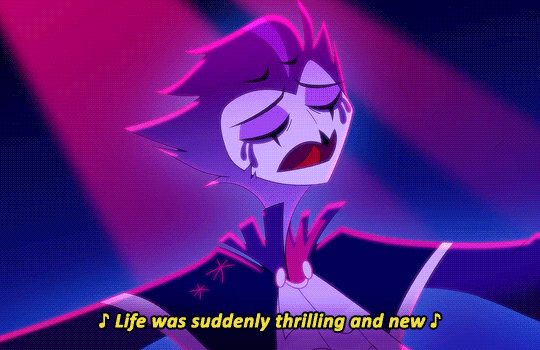
Critics who claim Helluva Boss “lost its edge” by softening Stolas misunderstand both the show’s creative vision and its inherent nature. From its inception, this animated series was never intended to be a purely dark, edgy, humor-driven romp like other popular animated adult media. Instead, it crafts a world where comedic chaos coexists with moments of genuine tenderness, showing that even demons are capable of love, vulnerability, and growth. Stolas’s evolution is not a betrayal of the show’s premise but a natural outgrowth of its thematic focus on complex relationships and emotional development.
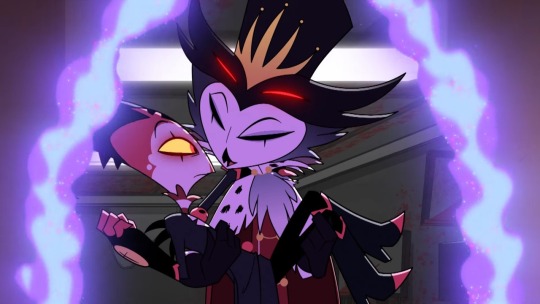
For some fans accustomed to the biting satire of other adult animation, Helluva Boss may have felt like a bait-and-switch. These viewers often dismissed early hints of deeper emotional storytelling, only to express disappointment when this trajectory was confirmed in episodes like The Circus. In truth, Helluva Boss never aspired to replicate a familiar formula. Its signature blend of raunchy humor and heartfelt drama leans into yaoi-inspired, Tumblr-core storytelling—a sensibility that resonates deeply with a very specific 30-something-year-old audience who grew up immersed in a very specific corner of online fandom culture. (💁🏽♀️: Remember when we made that post about how we need to STOP qualifying our enjoyment of our gay furry show with “well it has writing issues but..” Well, in the same vein, Yaoi/BL is morally neutral and I’m tired of pretending HB is not inspired by it 🤠) Those who recognized this aesthetic from the start quickly understood that emotional complexity was always part of the show’s charm.
Stolas’ Tenderness was Always Intended
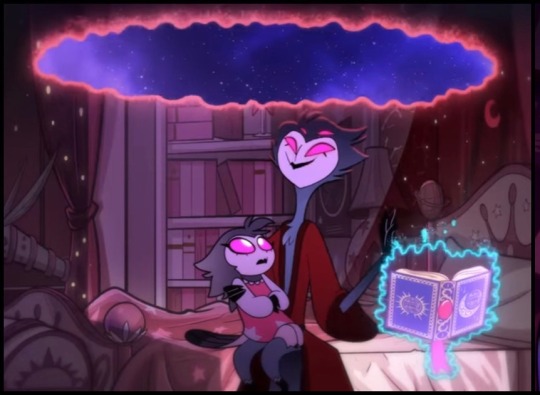
The assertion that Stolas was “softened” disregards critical early moments that showcased his complexity. In Loo Loo Land, Stolas’s sincere attempts to connect with his daughter, Octavia, stand in stark contrast to his flamboyant antics. His heartfelt concern for her reveals his capacity for love and vulnerability, hinting at emotional layers beyond his flirtatious persona. This was not an isolated incident but a clear signpost that Helluva Boss was building toward richer character arcs.
From the very beginning, Stolas’s interactions with Blitzø in Season 1 hinted at a deeper emotional connection beyond mere transactional or comedic exchanges. His flirtations were interwoven with moments of genuine sincerity and longing, suggesting that his feelings for Blitzø extended far beyond casual lust. Subtle cues—such as his wistful tone during conversations and his willingness to grant Blitzø access to the grimoire without imposing strict conditions—revealed an emotional vulnerability that contrasted sharply with his otherwise flamboyant demeanor.
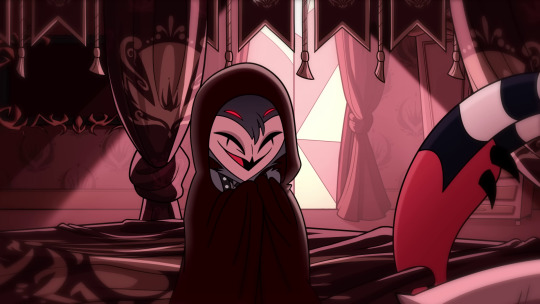
The narrative carefully planted these seeds of emotional depth, even if some viewers initially overlooked them. Stolas’s persistent attempts to engage Blitzø on a personal level, despite Blitzø’s indifference or annoyance, underscored a yearning for connection rather than mere physical gratification. These moments laid the foundation for the complex and evolving dynamic between the two characters, foreshadowing the more intimate and dramatic developments in later seasons. This early groundwork makes it clear that their relationship was always meant to transcend surface-level comedy or transactional convenience.
A Commitment to Growth, Not Softening
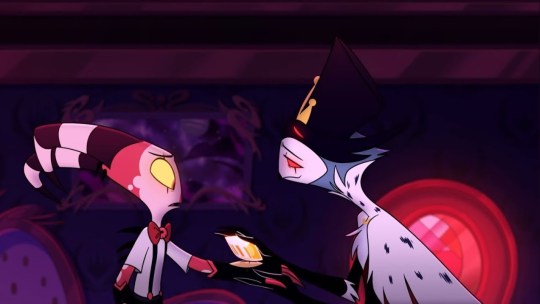
Stolas’s arc aligns seamlessly with the show’s commitment to exploring messy, imperfect relationships. In Season 2’s The Circus, viewers gain insight into his loveless arranged marriage and years of emotional repression. This backstory contextualizes his longing for connection with Blitzø as something rooted in a desire for genuine companionship rather than mere physical gratification.
Detractors who label this evolution as “softening” overlook how Helluva Boss crafts stories about growth through vulnerability. Stolas is not being sanitized; he’s being humanized. His journey reflects the show’s thematic exploration of love as messy, painful, and transformative.
The same applies to Blitzø, who continues to grapple with his fears of intimacy and emotional openness (Truth Seekers, Season 1, Episode 6). The dynamic between Stolas and Blitzø evolves as both characters confront their insecurities and past traumas. Stolas, in particular, adjusts his approach to respect Blitzø’s boundaries, demonstrating genuine emotional growth (Ozzie’s, Season 1, Episode 7). This is not a retreat from the show’s chaotic roots but a testament to its nuanced storytelling.
Genre Expectations and the “Bait-and-Switch” Critique
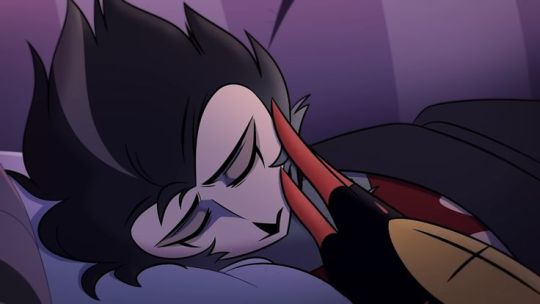
Much of the criticism surrounding Stolas’s development stems from genre expectations rather than actual narrative shortcomings. As Helluva Boss increasingly foregrounds romantic dynamics—particularly between Stolas and Blitz—it draws heavily on tropes from yaoi/BL storytelling traditions. These genres often explore heightened emotional drama, intricate power dynamics, and slow-burn character development, which may feel unfamiliar or even jarring to viewers expecting the biting cynicism of shows like Rick and Morty or Bojack Horseman.
This reaction, however, speaks more to personal genre preferences than to flaws in the writing. The show’s embrace of yaoi-inspired storytelling was evident from the outset, marked by its exploration of vulnerability within flawed power dynamics and its penchant for heightened drama. For fans steeped in these conventions—and particularly those familiar with Tumblr-core fandom culture—this narrative direction felt both organic and deliberate. Blitz and Stolas’s relationship is not merely a romantic subplot but an exploration of intimacy within imperfect systems of power, a hallmark of BL storytelling that resonates deeply with audiences who grew up immersed in these spaces.
For viewers unfamiliar with these influences or seeking something more traditionally edgy and action-driven, this tonal shift may feel discordant. However, this dissonance reflects a clash between audience expectations and the show’s creative intentions rather than evidence of poor storytelling.
Finding Harmony Between Chaos and Heart
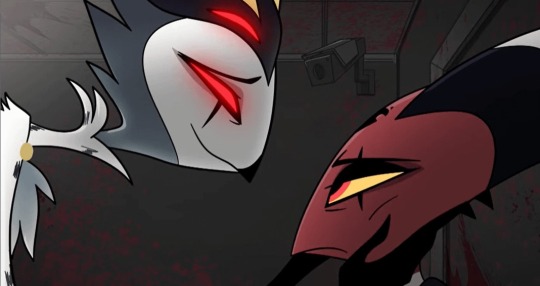
Although Helluva Boss could have easily ventured into pure “edgelord” territory, it has consistently found a balance between its darker elements and heartfelt moments. The relationship between Stolas and Blitzø exemplifies this equilibrium. What began as a transactional, arguably exploitative arrangement has evolved into something far more profound, as both characters confront their vulnerabilities.
The emotional complexity of their dynamic enriches the series rather than detracting from it. Stolas’s longing for Blitzø is emblematic of his broader struggle for self-determination after a lifetime of duty and repression. Blitzø, meanwhile, navigates his own journey of self-acceptance and fear of abandonment. Together, their relationship serves as a narrative vehicle for growth, chaos, and healing.
Conclusion: Growth, Chaos, and Tumblr-Core Sensibilities
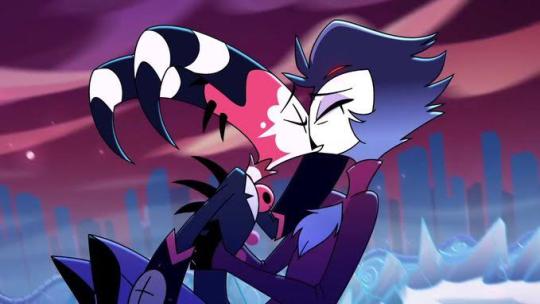
Stolas’s evolution does not weaken Helluva Boss—it strengthens it by remaining true to the show’s foundational themes of growth and connection amidst perpetual chaos. From the beginning, the series sought to explore the complexities of flawed characters striving for meaning, rather than merely indulging in gratuitous edginess.
By challenging preconceived notions of what adult animation “should” be, Helluva Boss solidifies its identity as a bold, emotionally resonant series that isn’t afraid to blend edginess with heart. Detractors may see the romantic direction and yaoi-inspired tropes as a departure, but for those who recognize the intentionality behind these choices, the narrative only becomes richer. The show’s willingness to defy expectations and lean into authentic emotional storytelling cements its place as a uniquely compelling work in the landscape of adult animation.
#helluva boss#vivziepop#stolitz#helluva boss meta#hellaverse#spindlehorse#fandom meta#stolas#blitzø#and DAMNIT we just like our gay furries#ask us why yaoi/BL is morally neutral#and remember kids: moral correctness has no place in media analysis 😇
165 notes
·
View notes
Text
I made a humans are weird pamphlet
⸻
[Welcome to Earth!]
Diplomatic Briefing Pamphlet: The Human Species
(For Official Use Only – Do Not Leave in Orbit)
⸻
Species Designation: Homo sapiens
Common Names: Humans, Earthlings, Gremlins with God Complexes
Status: Emotionally volatile. Excessively curious. Terminally dramatic.
Threat Level: Vibes-based. Somehow both harmless and extremely dangerous.
⸻
1. General Overview
Humans are a carbon-based bipedal species that developed intelligence, opposable thumbs, and the alarming tendency to either love or destroy everything they encounter.
They are fueled by caffeine, spite, and memes.
Despite their fragile physiology, humans are incredibly persistent. If an environment is considered “inhospitable,” a human will attempt to live there for fun or content.
⸻
2. Cultural Duality
Humanity exists in a state of constant contradiction. Examples include:
Dark Side Wholesome Side
Warhammer 40k Stardew Valley
Doom Eternal Animal Crossing
Final Destination Pride and Prejudice
The Crusades Bake-Off Competitions
Exploiting labor via colonial empires Adopting stray animals and crying
They are simultaneously writing love poems and building orbital death platforms. Proceed accordingly.
⸻
3. Violence (See Also: Sports)
Humans made rules about how to be less evil during war, then immediately violated them. These are called the Geneva Conventions.
They also made sports out of fighting each other for trophies, fame, or vibes.
Favorite pastimes include:
• Beating each other senseless in a cage
• Running at 40 km/h for fun
• Climbing lethal mountains
• Jumping out of flying machines
Note: They will say it’s “for the experience.”
⸻
4. Denial Reflex
Even in the face of literal interstellar beings landing on their lawns, many humans will:
• Claim it’s CGI
• Blame the government
• Insist it’s demons
• Ask for merch
They evolved this reflex to avoid existential crises and somehow made it a cultural cornerstone.
⸻
5. Reproduction & Romance (Warning: NSFW)
Human mating behavior is chaotic and often ritualized via elaborate apps, confusing signals, and courtship dances involving memes. They:
• Invented robots for companionship
• Wrote fanfiction about everything
• Made “tentacle romance” a genre
• Occasionally attempt to seduce supernatural entities
Proceed with caution and boundaries. Consent is important. They learned that… eventually.
⸻
6. History (Not for the faint of core)
Earth’s timeline is packed with:
• Empires built on slavery
• Religious wars over metaphysical real estate
• Repeated cycles of “oops, genocide”
• Philosophers who were also warlords
• Burning witches. And books. Sometimes both.
They also recorded these events, dramatized them in film, and won awards.
⸻
7. Interaction Tips
• If a human offers you food, accept it. Then ask if it’s poisonous. Sometimes it is. They eat it anyway.
• Avoid debates unless you have 6 hours to spare and a tolerance for shouting.
• They will name you. Prepare to be called “Steve” or “Gary.”
• Do not show fear. They can smell it.
• Show them a shiny rock and they might worship it or mine it. Possibly both.
⸻
8. Warning List
DO NOT UNDER ANY CIRCUMSTANCE:
• Mention their oceans. Even they don’t go down there anymore.
• Bring up Australia without mental prep.
• Assume they’re peaceful just because they’re smiling.
• Take them to space before explaining that aliens exist.
• Say “Warhammer is real.” Some believe it already.
⸻
Final Summary:
Humans are unpredictable, violent, hilarious, empathetic, and incredibly weird.
They’ll destroy a planet for oil and then cry over a 2-minute animal rescue video.
They are terrifying and lovable, like if a raccoon had a PhD and nuclear codes.
We recommend extreme caution, cultural immersion, and bringing snacks.
⸻
Issued by:
GCIR – Department of Chaotic Species Affairs
Document: Earth-001-HowToHuman (Rev. 2.0 – Updated after Florida Incident)
⸻
75 notes
·
View notes
Text
Ivan & Till: When One Character's Inferiority Complex Meets Another's Superiority Complex
Heavily based on this post by @pwippy
To outline what's already been said in this post about Till's apparent tendency to view himself as "superior" to his peers: There's often a mindset that those who lack companionship will adopt to protect themselves from the idea that can come with loneliness that there's something wrong with them. This idea is best summed up as "I'm alone because I'm different. I'm better than them."
Till seems to have adopted this mindset. We know based on the ALNST comics with the Ivan and Till "Cheer up!" scene that Till is lonely. He has no friends. And when Ivan bluntly points this out to Till, Till lashes out hard, hitting Ivan and knocking him to the ground before storming away. Ivan's observation got to him. It did what Ivan is always trying to do; it got a rise out of him.

To protect himself from fear (the fear that he only made it through Urak's experiments by chance, by sheer luck and not because he's better) and rejection (rejection from his peers, from Mizi, even an entire audience) Till has to convince himself in his head that there's a reason for all this. He's better off alone. He doesn't need anyone. Even Mizi, who he adores and admires, is kept at a distance. Till is never once upfront about his feelings. He can't take that sort of rejection, ESPECIALLY not from Mizi. He eliminates the chance of rejection altogether by simply watching her from afar rather than approaching her and really trying to be her friend.

(Look at his cute little face I'm going to cry)
Even a crowd Till acts like he doesn't care about? Like he doesn't care what they think, like he's beyond caring? In Round 2, he didn't even give them a chance to reject him. He made sure they couldn't. He didn't even let his opponent sing.

Ivan, on the other hand, doesn't seem all that concerned about rejection. Unlike Till's fear with Mizi, Ivan is all over Till and isn't deterred when Till reacts to his teasing with irritation. This doesn't mean Ivan isn't hurt by Till's rejections, specifically Till's last-minute decision not to run away with him, but this does mean Ivan is okay with being hurt again, and again, and again as long as he gets to be around Till.
Ivan's complete lack of care about his own mental state is the result of an inferiority complex. Ivan has absolutely no regard for his own wellbeing. He only cares about Till yet doesn't truly believe he's worthy of Till. I always find it interesting (and refreshing) that Ivan isn't jealous of Till's crush for capturing his attention. In fact, Ivan doesn't ever show signs of resenting Mizi at all. He treats her kindly and doesn't fixate on her in an unhealthy, envious way. They're friends despite the object of Ivan's affection being captivated by Mizi. While I love their dynamic and find it nice that Ivan isn't jealous of Mizi, jealousy is a natural human emotion, and Ivan's lack of it really tells me how little he thinks of himself. Why would he be jealous if he doesn't have a chance with Till in the first place? He'll content himself with existing in his orbit, thinking even this little piece of his attention is more than he deserves.

Like Till, Ivan doesn't open himself up to the chance of connection with other children at Anakt Garden, although their reasons seem inherently different. While Till fears rejection, Ivan doesn't seem to even see a point. Till asks himself "What's the point?" in an attempt to convince himself he doesn't need friends, though he doesn't believe it. Ivan asks himself the same question and genuinely doesn't know the answer. No, Ivan is not invincible to being hurt or rejected. Maybe he's past fearing any such thing at a certain point because nobody knows who he really is anyway, not even Ivan himself. How can he be afraid of someone hurting him if they can't touch him? The one time he expresses himself genuinely with Till, he knows that he won't have to deal with the consequences. He won't have to deal with the hurt that comes with being open again.

Having such radically different views of themselves, their relationships with others, and the world around them, it's no wonder Till and Ivan lack communication and understanding. As individuals, they have deeply complex psyches; Till keeps pushing people away, and Ivan keeps letting himself be pushed and then coming back around even though he already knows the result. He just doesn't see worth in anything in his life that isn't Till and this cycle. They both long for connection but don't know how to reach it. For them to come to an understanding, Ivan has to recognize his own worth (something Till uses as a defense mechanism) and Till has to open himself up to hurt (something Ivan does to an unhealthy degree).
They're identically opposite.
#alien stage#alnst#blue rambles#moon rambles#alnst till#alnst ivan#alnst analysis#alien stage till#alien stage ivan#ivantill#i am SOOOO normal about them#my post
146 notes
·
View notes
Note
I've been thinking about your cat shorts dark Ford prefers nikola au a lot (because he makes me sad 😔) and I've been wondering if he's like, pushing stan out explicitly. Would he change his mind after the right push? Like after stan has been pronounced dead by law? If this dark Ford still ended up fighting with Bill, would stan sticking around to protect him and then getting tortured make him reevaluate? Or would he pretend it was just "nikola" being a pal even though he knows otherwise.
I suppose the way this Ford contradicts the relationship that I find the most compelling and complex in the show and in Fandom very brain poking. What do you mean you are willing to let your brother be a cat?? Even though he was pretty shortly referenced.
Love your work, hope you're well <33
Dark Ford prefers Nikola is an interesting one, because the idea with him is on some level he's so lonely he's living in complete denial. This is a Ford who never reached out to Fiddleford for help (at least not right away) and never got Stan's car and Carla. He's not evil per say, and it very possible he'd also rage at Bill's betrayal and work to destroy the portal.
He's like Stan in a way. The relationship they have right now works, and he gets to be with his brother and have companionship as long as he doesnt acknowledge that his cat is Stan. If he acknowledges it, then that means he has to do something about it, and then Stan will be human and might leave. He's shoving down all the evidence Stan is showing him like how he shoved down how much he missed Stan to begin with. The news of Stan's death might actually have the opposite effect of Ford clinging to 'Nikola' harder, as now Stan really doesn't have anything to return to.
Stan would never abandon Ford, not until the moment its revealed their relationship is unsalvagable. His issue with the Dark Ford that discovered Nikola was Stan via soul shredding is that every touch is a painful reminder of what his brother did to him, and how agonizing it was. The never Nikola Dark Ford was revealed not to care about Stan himself and just liked the idea of Stan, without showing a willingness to change or communicate with Stan as equals. In this one he just thinks Ford really is that dense, and if it ever came to a point where Ford revealed he knew it was Stan but was in denial because he was afraid of what would happen next, then Stan would forgive him as long as they moved forwards and Ford uncursed him.
In the universe where this Ford fights against Bill, he'd cling to Nikola being 'just a pal' right up until he hit the mental tipping point and had a break down. He has no one to turn to, and no one to blame for his situation but himself. Except Stan is right here. The only person Ford can trust and depend on, who he's been ignoring for months just because it was easier. At that point he'd cling to Stan and admit to everything, how he knew it was Stan, and he was terrified of what might happen if he tried to do anything to help. Terrified of being alone, that maybe Stan just stuck around for so long because he didnt know anyone else who could help him. That he was the worst brother, only willing to face the truth due to desperation in his own circumstances but not for Stan himself. Which would lead to Stan forgiving him, them teaming up to beat up Bill, then Stan lording this over Fords head forever (and Ford holding Stan's willingness to be that cat over his head also. Just the saddest brothers over here, more willing to be pet/owner then have a conversation).
He's a Ford whos lonely and scared to confront reality. Just like Stan in the orignal fic, he has no idea what would happen if he turned Stan human, and the fear holds him back from taking that step.
37 notes
·
View notes
Text
Father, Help (Thanks To Them)
Context is everything. In the case of Thanks To Them and more broadly the third season of The Owl House as a whole, this is the production history.
Put simply, there was a third season, then there wasn’t, then there was again but under the proviso that there was less of it. As a result, thanks to them is fourty four minutes long and contains enough material for about four hours of story. This is a dense episode of television. A mini picture in its own right.
Which adds a bit of complexity to my blog. I take things one episode at a time and have strategically chosen series with short episodes because my feeble ADHD mind is equivalent to a Tuna with a ball of string in everything but name. So, this post is going to be in three sections, because there is a lot to talk about.
Let me explain.
SPOILERS AHEAD: (The Owl House, Jurassic World: Camp Cretaceous, Critical Role: Campaign 2, The Odyssey)
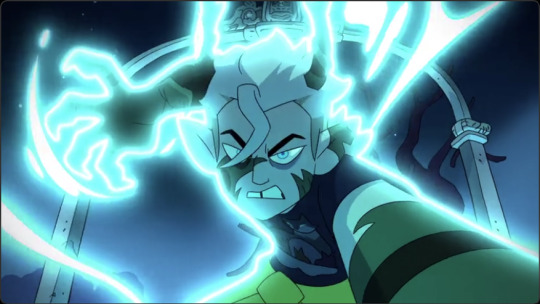
Part 1: "Within every man and woman a secret is hidden, and as a photographer, it is my task to reveal it if I can."
Thanks To Them was released more than two years ago, and in that time, one element has stuck with me more than any other. Not something substantial or moralistic or showstopping. A single element that confused me. Willow’s Camera.
You would think that this is an insignificant little detail, but this episode doesn’t have those. Luz schoolbook is the Odyssey, the Giraffes are exiles, Cosmic frontier is used as a metaphor so blatant the characters within pick up on it. Everything in this episode has at least symbolic relevance to the story at hand or is a callback to previous moments. Everything, except the camera.

If you squint, the camera might be a reference to Understanding Willow, but as I discussed in my post about that episode, that isn’t about Willow, it’s about Amity and her guilt. The photographic memories don’t come up again in relation to these two, and this version of that metaphor doesn’t directly interact with Amity at all.
Nonetheless, it’s a good place to start.
That episode establishes a clear metaphor for the photograph. Memory. As such, the imagery can be examined here through the same framework.
I think it is crucial to start at the beginning, the first photograph that Willow takes.
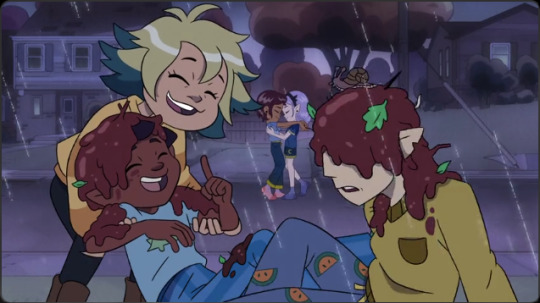
Joy and love in the face of hopelessness. Absurdity, comradery, companionship.
It’s a tender moment. The abrasively upbeat intro music dials back for a second to show the rain. Simple to us, but in the boiling isles, rain is terrifying. The rules are different here, and our characters are showing joy in the moment. Not everything here is trying to kill them, not everything here is antagonistic, and if you don’t celebrate the little moments of good, you will only remember the bad. Hope keeps you going, light do not faulter.
This isn’t the first time photographs have been shown in this episode, it’s just the first time that Willow has taken them. If we look back a few moments, we see Luz’ coming out presentation, and we see this:

Again, joy and friendship and love. The photographs ground our characters and keep them moored in reality.
That’s why the intro cinematic is so janky. It doesn’t fit with the tone because life goes on anyway. You aren’t going to get anywhere sitting on your laurels. You have to look on the bright side. Sometimes that is the simple joys of companionship and laughter, sometimes that is the spark that will get you home. Both have their place.
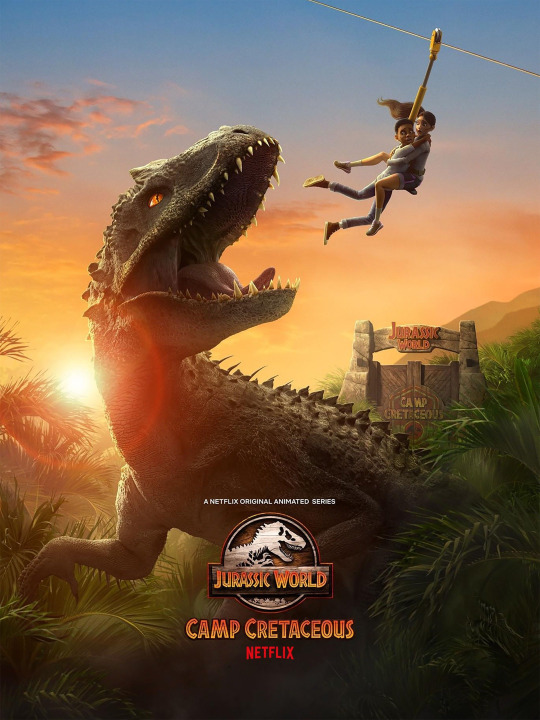
Jurassic World: Camp Cretaceous is a series that I love and the next on the chopping block when I finish The Owl House. It is a series that thrives on dissonance, and part of that is its tone. JWCC operates on a sliding scale of humour and drama, and other than the first episode, never misses out on either. It is a series about balance, hope, and human horror.
The reason I bring it up, is because during the last episode of season three, the characters reminisce about times gone by, and one of them does this:
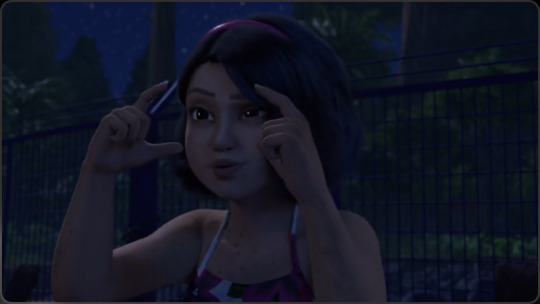
“Now smile, you two!”
This is Sammy, a character who exists to tacitly disprove every single statement any bad guy makes. She doesn’t mess with philosophy personally, but she is undoubtedly the heart of the group. Both emotional and moral.
Sammy has also had possibly the worst time of the main cast. The argument could be made for Yaz, but Sammy got blackmailed, shot at, bitten and stung more than anyone else in the series, and was mortally wounded four episodes prior to this scene. But when she is taking photographs, she remains upbeat.
“Do you really want my mental picture of this place to have you with your eyes closed?”
Treasure the good times, especially when they are dwindling.
Light, do not faulter.
I started this section with a quote from Yousuf Karsh, who, as implied by said quote, was a photographer. Born 1908 in what would become Turkey, he immigrated to Syria and then Canada. I guarantee you that you have seen at least one of his works before.

This is Yousuf Karsh. Or more accurately, a photograph taken by Yousuf Karsh of Albert Einstein, and I want you to take note of the defining characteristic of this piece.
Light.
Yousuf Karsh’s understanding of light was incredible. He used it to guide the eye and reveal, but he also used it for detail. In monochrome, the only contrast is between different shades. Everything is affected by the light, it controls how you see the image.
But the darkness, that was key. Darkness exists as contrast. For the light to be special, it must have something to be shined upon.
“Character, like a photograph, develops in darkness.”
But there is something else. Photographs are a history. They say that we are here, they provide evidence.
In the context of The Owl House, which was cancelled for (in my opinion) suspicious reasons, this is evidence of queer folk. We have always been here and are here, even when people try to pretend we are a fad or a social experiment. We are history, and history is still happening.
Yousef Karsh died in 2002.
Shrek and Monsters, Inc. both came out in 2001. Yousef Karsh and Mike Wazowski existed at the same time.
This man photographed Winston Churchill, Ernest Hemmingway, Martin Luther King Jr, Marian Anderson, and George Bernard Shaw, amongst many others. All of whom shaped modern life but are icons of history gone by. The eyes that shone a light on them were still seeing that light in 2002.
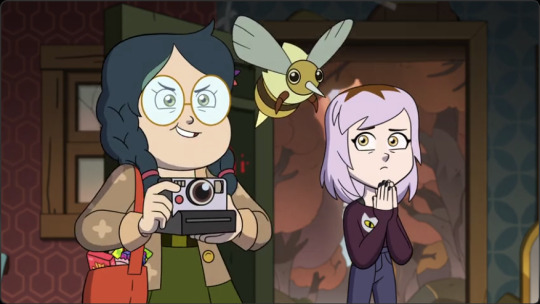
Willow’s photography exists to show that life kept moving, and continued to do so. But it shows what she chose to remember. Small moments of joy and light.
Light, do not faulter.
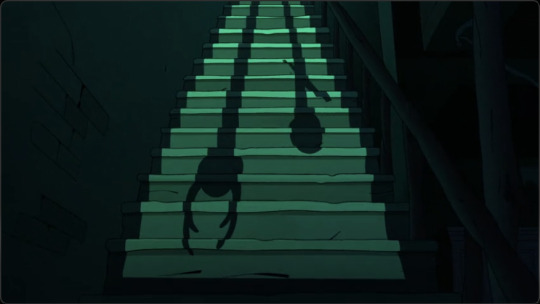
Part 2: “It is a unique and exquisite complication, family.”
Thanks to Them doesn’t start with Thanks To Them. It starts with the end of King’s Tide.
Those opening shots are mostly a replica of the final moments of the previous season. We miss the zoom out to the rain and Luz opening and reopening the door, but other than that, these are those shots.
The first piece of new story that we get in season three of The Owl House is this:
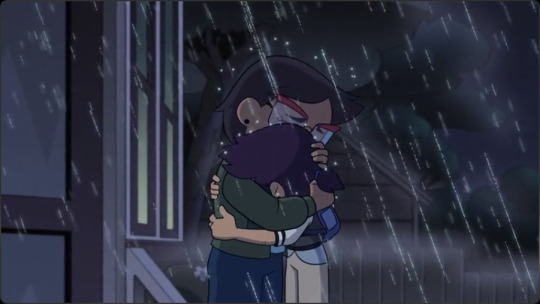
I would like to use this to frame a conversation about family as it is presented in this series.
Not every story has a moral, and that isn’t a bad thing, but The Owl House does have a thing or two to say about what makes a good family unit. In this context, good family is defined by acceptance, bad is control. Empathy is paramount.
For example, Camilla’s first response upon her daughter’s return isn’t victorious or reprimanding, there aren’t any thoughts about what will happen next, it is immediate “my child is in pain, I must do something about that.” There’s that empathy.
Acceptance is letting people be who they are, control is the opposite of that. But this isn’t a binary, and Camilla spends this episode and the series at large moving along the spectrum.

Camilla’s first response to the kids is to seek understanding, and it’s clear that she is always far from her comfort zone in this episode. Her response to Bellos is bafflement, she reacts to the summary of the previous season with the exact same energy as anyone having a show explained to them, and she has a clearly overstuffed book explaining how to keep track of the kids.
I will get back to that book.
But she was introduced in season one as a controlling figure. She was the antagonistic parent who inadvertently kickstarted the series. Summer camp.
Not counting Grom, because that was Luz’ fear, Camilla’s next appearance was in season two, when she evolved significantly as a character.
I wrote a post on that episode, and in it I mentioned the dichotomy of this character. She was someone who was fundamentally kind and accepting, but who was antagonistic to Luz because of the perceived lack of that kindness.
Camilla also inspired in Luz’ guilt character development in the previous season. She begged Luz to stay back because she blamed herself for sending Luz away. Although, looking closely, Luz’ memory of that is faulty.
Nevertheless, Camilla controls Luz, intentionally or not, and that control has a negative impact on her.
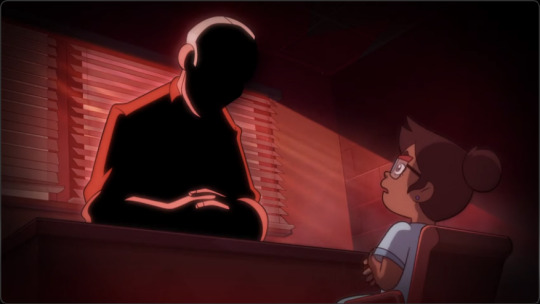
Then we get the dream, which establishes Camilla’s angle, and it’s the same as her emotion now. Uncertainty.
Camilla was out of her depth, so she made decisions based off advice she was given by people who refused to understand. She has seen the consequences of that, so she changed. She learned.
Knowledge and ignorance are another key theme in the series. Camilla plays into that here.
Interestingly, this is where she contrasts with Eda. Both are maternal figures for kids from a different world. But Eda’s journey was a downward spiral brought about by the stress of the end of the world. Her strategy for finding food for Luz was sticking with what she knew, Camilla has evidently been experimenting and learning, as shown by the number of notes in the book.
Eda wilfully stayed with what she thought she knew out of a desire for safety. Camilla sought to understand fully.
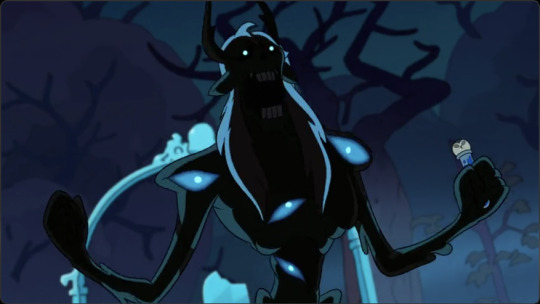
Pictured here, a man who believes he can do no wrong because he is human. Look at the eyes though. He has so many eyes, but he can't see what is directly in front of him. He cannot see that he is wrong.
Contrast Camilla with the two main negative parental figures in the series, Odalia and Bellos.
Odalia isn’t in this episode, so I won’t dwell on her too much. But her main motif in the show is a desire to control and command her children and husband. She wants to be in charge and is used to power, so she limits Amity’s choices down to those she may spend time with.
Symbolically, this is expressed through Amity’s choice of hair colour and the fact that Odalia has such a large say in this.
In addition, Alador’s path to redemption starts not just when he stops being complicit in Odalia’s behaviour, but when he starts making an effort to understand and empathise with his daughter.

Bellos on the other hand, possesses his child.
For all intents and purposes, Bellos is Hunter’s parental figure. They have a familial relationship that is nominally uncle and nephew but gets more complicated when you factor in Grimwalkers and generations thereof. So, for the sake of argument, Bellos is Hunter’s parent.
I don’t believe it is controversial, however, to say that Bellos is a pretty awful parental figure. He is blatantly cruel and manipulative. He’s also just bad at it in relation to competence.
The control thing is obvious. He literally possesses his child, taking their body and using it as a tool. He literally overrides Hunter’s freedom over his own actions and changes the boys’ appearance to do so.

“You know what I'd like, Belos? I'd like to leave the Emperor's Coven and never step foot in that throne room again. I'd like to study wild magic, and learn how to carve palismen. I'd like to attend Hexside as a regular student and play flyer derby with my friends. But most of all, I'd like to make sure you never hurt anyone again!”
There are three things to note here.
First, Hunter expresses his rebellion against Bellos by asserting his will. He is expressing that he is, in fact, a person.
Bellos exists on dehumanisation; his power is a claim that free-will doesn’t exist. Hunter’s way of breaking free from this is simply pointing out that free will does exist. Absolute statements crumble with a single outlier.
Which is another theme of the series, the dichotomy of nuance and simplicity. Bellos represents simplicity, Luz is the personification of nuance. I will come back to this.
Second, this is a weirdly soldierlike way of dealing with the problem. Even weirder, it evokes fairytale and mythological imagery.
“I miss knowing who I’m supposed to be.”
Hunter is a character who is almost always scared out of his wits, but he is an impeccable tool in Bellos’ arsenal because of his ability to focus. Repeatedly, when Hunter is given a single objective, he blocks out any fear and gets that objective done. He is efficient, and competent, when he knows what he is doing.
Eclipse Lake and Hollow Mind show Hunter at his frailest because he doesn’t know what he is supposed to be doing. He has relied upon others telling him what to do for so long, that an unclear objective leaves him floundering.
But in both cases, he shows his own resourcefulness and strategy for adapting. He finds a small-scale objective. He is struggling to win the favour of the Emperor, so he finds a thing that the Emperor needs and objectively clears every obstacle through guile or brute force to claim that. He goes on the run from the Emperor and is shown to have turned that focus to surviving and finding food in Labyrinth Runners.
In Thanks To Them, Hunter reutilises that strategy. He decides upon a goal and shuts out everything else. He finds his coping mechanism and weaponises it. He wants to stop Bellos from hurting people, so he removes Bellos’ goal from the equation. It is that drive that frees him.
But, who gave Hunter the skillset to accomplish this feat? Who trained the child as a soldier? Who taught him to shut out the fear?
Bellos. The Emperor created his own weakness.
In world Mythology, this is a common trope. King (or parent of some kind) hears prophecy of doom surrounding his close relative and, in his attempts to avoid said prophecy, accidentally gives the relative the exact skillset and motivation to defeat him.
Here, that descendant is Hunter, who is a clone. Every clone before Hunter has rebelled against Bellos, but he keeps going because… maybe this one will be different? Like I said, Bellos ain’t good at this.
Bellos created someone he knew would one day rebel, then gave that person the exact skillset necessary to subvert his magic. Then he abused the kid and forced him to try and escape.
Although, there is a cruel twist to the formula. Bellos, when he realises that Hunter is winning, decides to take the both out together. He won’t let Hunter escape, even when he does. It is cruelty, and it’s needless.
Bellos has shown that he is cunning. He could have tricked Hunter into opening the portal or he could have WAITED FIVE MINUTES FOR LUZ AND CO TO DO IT FOR HIM.
But no. Once again, Bellos chose to be cruel, and it nearly got him killed.
Nearly.

The third element of this sequence is how quickly Camilla reacts, and how similar that reaction is to Hunter's. She has been out of her depth, but she sees something she can do, and she dives in. Camilla doesn’t understand magic, but she understands drowning and how to save a kid from that.
Bellos tries to kill Hunter, and Camilla stops that. The good parent prevails.
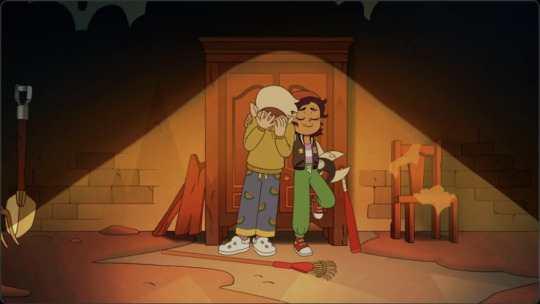
But family isn’t just about parents and children. Hunter has a found family in Flapjack, who also sacrifices himself for the boy, as well as in Luz and co.
“Gonna make sure you're safe too, Hunter. You're family now.”
I want to point out that, as I have stated, Hunter’s confidence doesn’t come from the mask, it comes from having a clear task ahead of him.
More importantly, however, is the fact that this scene breaks him. Family looks after each other, and Hunter is receiving that love and compassion and understanding from those in the Hex Squad.
He has a kindred soul with Gus, he has a sibling dynamic with Luz, and he has the romantic connection to Willow. He has people who show him empathy, and behind an expressionless mask, we see him cry.
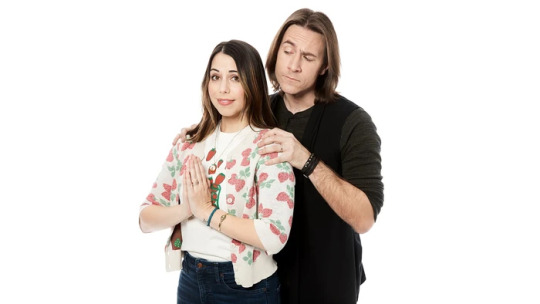
The title of this section comes from the second campaign of Critical Role. Specifically, the episode entitled The Threads Converge.
The episode builds up to a meeting between one of the protagonists, Jester, and her mysterious father figure, known as the Gentleman.
To be clear, the two have met prior, but have been unaware of their connection. Then the information was made available to both of them, and tension ensues.
Jester runs the situation through with her friends repeatedly, scenario after scenario, unsatisfied with all of them, while the Gentleman avoids the subject entirely.
Until who should step up to the plate but Caduceus Clay, humble cleric and wise man.
“My family had to... I don't know where they are, and I don't know if they're okay, and it's been a long time, and there is a part of me that is very lonely.”
You won’t always have your family. So, treasure them while you have them.
The conversation revolves around a rare tea only found in one place. It’s delightful and a thing to share with people, and the only place it can be found is the Blooming Grove.
On the one hand, the Blooming Grove is a graveyard, and the tea comes from flowers on those graves, perhaps hinting at hindsight as a blessing and a curse.
On the other hand, the rarest of tea comes from a place Caduceus calls home. It comes from the symbol of his family, and they have run out, maybe soon, so too will the tea.
Again, treasure your family.
In The Owl House, family is explicitly not a guarantee. The Hex Squad is trying to get home, but they don’t know if they will. But also, they don’t know if there will be a way to keep getting through. Either Luz will have to say goodbye to them, or to Camilla.

Part 3: “My Name Is Nobody”
The book that Luz is reading in school is The Odyssey, and it is important to me that she misses the point entirely. Yes, yes, it’s technically called The Plight of the Mariner. But come on. It’s The Odyssey.
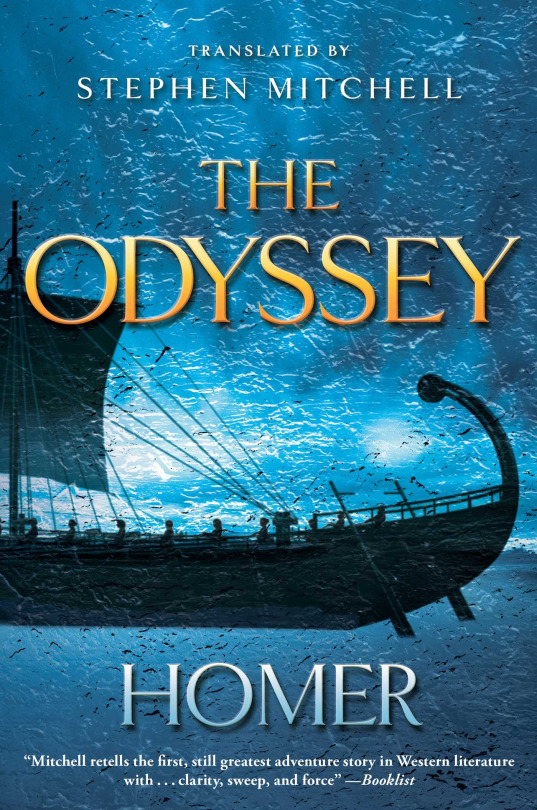
The Odyssey is the journey of an eejit who is the smartest man in Ancient Greece by process of elimination. I say the smartest “man” because there are women in the story who I would argue are more intelligent than him, and there aren’t any non-binary friends in the book to my knowledge.
Nevertheless, Odysseus is a trickster trying to get home after he made the brilliant decision to directly annoy the god of the sea while firmly in that gods domain, dooming him to arrive ten years late.
The point I am making is that Odysseus is a betrayer who makes mistakes constantly and yet is still able to come home. He is a doofus, but he learns, and he evolves, and he finds a way to succeed.

Luz’s reading of the story is a little different.
“Who cares about the ripple effects? He was just a pawn in someone else’s game. And he was never smart enough to realise it. If his friends and family knew about his mission, they’d know that their lives would have never been in danger if it weren’t for him. They should hate his guts, and it would have been better if he literally never existed!”
Clearly, The Plight of the Mariner is slightly different to the Odyssey. The Odyssey doesn’t have a clear mission given by an external force. But it does have a few other things.

I find it very funny that the chalkboard has the themes of the story written on it. “Fate vs free will. The _ of the hero”. I know authors who use subtext, and they are all cowards.
Interestingly, the blank left by the teacher’s head. It’s a pretty key part of the sentence. The something of a hero. The peril? The destiny? The choice? The path? All different meanings of the book.
Which leads to the open ended nature of Luz’ story here in her mind. There is a dichotomy of free will and fate, and she has been conned, but the meaning is clear. The teacher has written up the thesis for everyone to see.
Luz is just obscured by where she is sitting. Her view of the theme is changed by her perspective.
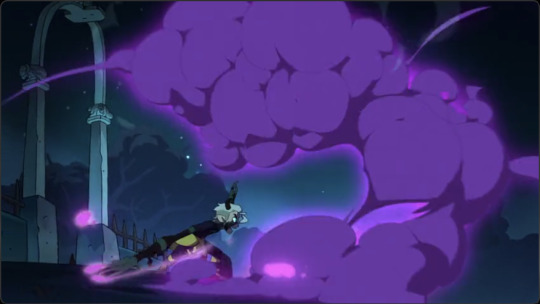
This part of The Owl House is the most traditional when it comes to storytelling. It is the darkest hour, so it leans really hard into the depressive feeling.
A large part of The Owl House is that sense of freedom and expression. It deals with archetypal storytelling through subversion. Wizarding school? Witch school. Rival? Love interest. Protagonist? Bisexual.
I have stated before that every character has an analogue in the Harold Potts books. Willow is the troubled student and friend who specialises in plant magic, Eda is the mentour inflicted with therianthropy, etc. The only character who doesn’t have an analogue is Luz.
Luz is fundamentally her own person, that is her greatest strength. She is someone who cannot easily be defined.
So, in her darkest hour, Luz becomes like everybody else. She even wears a costume that literally dresses her up as another person. She leans into the depression, she gets all sullen and declares that she knows what must be done before the scene cuts away. These are stereotypical darkest hour beats, and they are being played straight. It’s jarring. We have seen this story before.
Luz feels like she is a traitor. She helped Bellos, she was conned, she got manipulated. It is her fault for being weak. Bellos does his best to reenforce this when he confronts her at the end of the episode.
“See, this is why you're so useful, Luz. You're so desperate to help people, you even helped me meet the Collector.”
I want to stress something. Being kind is not a flaw. Luz got conned, the emphasis is on the got. Someone conned her. Someone manipulated her. Someone very specific.
Bellos is deflecting the blame here, and we have seen him do this before with significant success in Eda.
Eda blamed herself for getting cursed and getting captured and exiled, instead of the people who cursed her and captured her and exiled her. It is a shifting of the blame from the abuser to the victim. How dare you stand where I was swinging my fist.
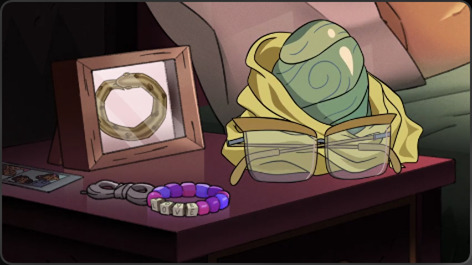
Camilla kept the snakeskin, specifically storying it in the form of an ouroboros. Symbolically, this is rebirth and renewal, which corresponds with Luz' take on the conversation.
“Mom, why aren’t you mad at me?” “Oh baby. Come here. I’ve been terrified, sure. But believe it or not, I do understand what it’s like to want to run away.” “I’m so sorry.” “But the point is, you came home, and everything is okay now.” “But it’s not. It’s my fault that everyone’s trapped here. And I don’t even know if King and Eda are okay. I wanted you to meet them so bad. But I keep messing up.” “Hey, everyone makes mistakes. What matters is that you learn from them.”
Luz misinterprets this conversation as well, taking the “learn from mistakes” to mean “stop trying”, which is not at all what Camilla was saying.
But also… you don’t think there was anyone else more responsible than you for what happened? Not one person who’s direct fault it might be for everyone getting trapped in the human realm?
Bellos is right there, girl, you can just point at him.
There’s a distinct sense of powerlessness on display here. Bellos has convinced everyone that they are responsible for their own hardship and that nothing they can do will escape that. But he is wrong, and not to be trusted.
Odysseus gets home.

Luz can find a way to get back to the Boiling Isles, and her friends are finding that as we speak. Willow has been taking photographs of all the happy moments, but Luz is too worried about what they might say when they find out she got tricked.
“I couldn't hate you, Luz. The fact that you still stand up for us means enough to me.”
Amity doesn’t care. Love prevails. She brings a different perspective to Luz’ mental block and helps find a way round.
But it is Hunter who returns the favour. Luz saved him, so he points out what I have been saying this entire time.
“You were tricked. That's what Belos does. He tricks people. But if it weren't you, it would have been someone else, and then there'd be no one left to fight back. So let's do that. Let's fight back. Please? For Flapjack?”
There is hope. It is feint, but it is there and will always be so. It is in the very fact that time keeps moving on. Luz is still here, look on the bright side. Think positive thoughts. Grit your teeth and keep going.
Light, do not faulter.

Final Thoughts
To pull back the screen here, I usually take two days to write a post. I set out time a week in advance so I have a buffer surrounding my work and ADHD, but overall, two days is enough.
I started writing this post a week before it went up, and as I write this, it will go live in just under eleven hours. I am yet to put in pictures.
I have so many thoughts about the final season of The Owl House, and especially Thanks To Them, but I think my next posts are going to be even longer than this one.
Specifically, because my next post, that of For the Future isn’t going to be analysis per say. Stick around if that interests you.
Previous - Next
#rants#literary analysis#literature analysis#what's so special about...?#character analysis#the owl house#toh#meta#toh luz#hunter toh#luz noceda#toh hunter#toh camila#jurassic world camp cretaceous#jwcc#jwcc sammy#Yousuf Karsh#critical role#critical role jester#critical role the gentleman#critical role caduceus clay#jester lavorre#caduceus clay#cr caduceus#cr jester#cr the gentleman#the odyssey#long post#holy moly this is a long post#light do not faulter
28 notes
·
View notes
Text

Matchup for @archive-of-the-lost
Congratulations you have a match with..



Kaeya Alberich !
★Kaeya mix of charm, wit, and intelligence aligns beautifully with your introspective and analytical nature. Like you, Kaeya is highly observant and has an almost uncanny ability to read people, which would make for an incredibly natural connection between the two of you. His sharp mind and ability to strategically navigate situations would resonate with your intellect, and he’d likely enjoy the depth of conversations that you both share.
★You and Kaeya both appreciate authenticity, which is something that shines through in your personalities. While Kaeya can be playful and flirtatious,he’s deeply reflective and has a complex, sometimes hidden side. His inner world is much more intricate than he lets on, and just like you, he values solitude at times, retreating into himself to recharge. He would respect your introverted nature and give you the space you need, understanding that sometimes you just need time to yourself. He’s not the type to pressure anyone into social situations, but he’s also someone who can be there for you when you do feel like talking, offering his companionship in a way that feels natural and not overbearing.
★When it comes to his communication style, Kaeya’s sarcastic humor and dry wit would resonate with you. He has a playful and teasing side, but it’s always delivered with a certain level of sophistication, much like your own sense of humor. He’s someone who enjoys a good intellectual challenge and would happily engage in conversations about your shared interests, such as literature, the deeper aspects of human nature, or even the art of storytelling. Your sarcastic remarks would be appreciated by Kaeya, as he himself enjoys a good quip or a teasing comment. However, he also knows when to dial it down and get serious, which would match well with your more introspective moments. His ability to balance playfulness with depth would make for an emotionally stimulating relationship where you could both be yourselves without the fear of judgment.
★Your love for intellectual pursuits would also find a perfect match in Kaeya. While he might not be the most traditional scholar, he is a strategic genius with a tactical mind, often thinking several steps ahead. His sharp wit and ability to quickly analyze and understand situations would align with your rational thinking. In a relationship, this would mean Kaeya is someone who would never be dismissive of your intellectual interests or your creative ideas. He’d be someone who encourages your aspirations and gives you the space to think deeply, while also providing stimulating conversations to help you develop your thoughts.
★One of the key aspects of your personality that Kaeya would understand well is your need for emotional support that’s subtle and non-intrusive. You’re not the type to openly express your emotions, but you deeply value emotional intelligence and being understood. Kaeya, though outwardly confident and sometimes guarded, has a deep emotional awareness of others. He’d know when to offer a listening ear or a quiet presence without pushing you into vulnerability before you’re ready. Kaeya’s not one for grand gestures of affections,instead he would express his care through subtle, thoughtful actions, which would be exactly what you appreciate. Whether it’s a shared quiet moment in Mondstadt or a small but meaningful gesture, Kaeya’s way of showing love would be understated but genuine, aligning with your preference for thoughtful, sincere affection.
★In terms of dates, Kaeya would be someone who values quality over quantity, much like you. He’s not the type to enjoy loud, chaotic events; instead, he’d love a quiet, intimate date where you can connect deeply. A sunset picnic by the ocean or a cozy night spent enjoying a cup of wine while talking about your shared interests would be the ideal way to spend time together. Kaeya enjoys experiences that allow for meaningful conversation and connection, and you would find peace in those more subdued, thoughtful moments with him.
★Kaeya would also appreciate your intelligence and your passion for creativity, as these are traits he holds dear as well. He wouldn’t shy away from discussing deep or philosophical topics, and he’d be thrilled by your ability to offer fresh perspectives. Your shared interests in analyzing human nature and dissecting characters would lead to long, fascinating conversations that would feed both your intellectual curiosity. In this relationship, Kaeya would be someone who not only shares in your creative passions but also encourages you to pursue your goals and dreams, knowing that you’re more than capable of achieving them.
★Your introversion wouldn’t be something Kaeya would try to change,instead, he’d embrace it and understand it completely. He knows that sometimes people need their own space, and he’s the type who respects that. When you’re feeling overwhelmed or simply need to retreat into your own thoughts, Kaeya wouldn’t take it personally. Instead, he’d likely offer you some space while also being ready to listen or comfort you when you’re ready to reach out. His calm, collected nature would help ground you when you’re feeling anxious or lost in thought, providing you with a steady presence.
★Ultimately, Kaeya would offer the perfect balance between independence and companionship. His ability to respect your boundaries, offer intellectual stimulation, and engage in emotionally intelligent conversations would create a space where you could feel both supported and free to be yourself. His sharp wit, emotional depth, and subtle expressions of affection would make him a great match for someone who values both personal space and a meaningful, intellectually stimulating connection. In this relationship, you would be able to be your authentic self, and Kaeya would provide the understanding and quiet support that you deeply appreciate, making for a fulfilling and harmonious partnership.
English is not my first language so I'm sorry if there are any spelling mistakes!

#matchup#genshin impact matchups#genshin impact#kaeya alberich#kaeya alberich x reader#kaeya x reader#Kaeya matchup#kaeya Alberich matchup
30 notes
·
View notes
Note
Yandere Chimeragon from School of Dragons (Pet-like)
Sure! Been a bit since I did a pet dragon concept, here you go! Sorry for the long wait :) Sorry it's a bit short.
Yandere! Chimeragon Concept
Pairing: Animal/Pet-Like
Possible Trigger Warnings: Gender-Neutral Darling, Obsessive behavior, Violence, Implied murder, Possessive behavior, Isolation, Manipulation, Brief blood mention, Forced companionship.

This beast is a volatile and powerful dragon.
While primarily a cross between a Bewilderbeast and a Sentinel... it has other species mixed within it.
This Chimeragon is a volatile yet noble dragon.
One of the scariest parts about it is the fact it can breathe fire, lightning, and ice.
Due to it's aggressive nature, you can only really successfully train one from an egg.
These dragons are mostly man-made anyways.
So you'd most likely get yours as an egg... but even then they can be a pain to train.
This dragon I feel would just like to do what it wants, even if you train it.
This is no doubt due to the primary Bewilderbeast genes.
This dragon feels it has a superiority complex, even if it isn't full a "King of Dragons".
It can be hard to control, even when it's young.
Which is why I feel having this dragon be overprotective can be dangerous to those around you.
To make this dragon attached it clearly has some level of respect for you.
Yet it also feels like it knows best for you.
Even when you scold your Chimeragon for snapping at another dragon or human... it just tolerates it.
It doesn't fully take your scolding to heart.
Your dragon feels it knows what's best for you.
In a way you can argue that your dragon feels you belong to it....
This dragon seems like it would come off as entitled.
If anyone came over to you, they're met with an elemental blast and a roar.
Your Chimeragon probably doesn't even care if it hurts or even kills those around you.
The upsetting part is the lack of control.
Your dragon trains you, essentially.
You may have to isolate yourself for the sake of others.
Which is no doubt exactly what the Chimeragon wants.
You living in the middle of nowhere... with no one around... and all your attention being on your dragon?
That's what your Chimeragon wants indeed.
Until it manages to isolate you, it will be violent towards others.
If you show sadness at your predicament, your dragon distracts you.
With this dragon... it's best you isolate with it soon.
Because it will no doubt cause a bloody scene just to keep you to itself.
133 notes
·
View notes
Text
I ship Zutara and I don't believe Aang is the Antichrist, despicable, misogynistic, depraved, or an abuser, as many paint him to be.
Let's dive deeper into the vast ocean of analysis regarding Zutara shipping and the complexities of the Avatar characters!
Exploring the Reasons Behind My Preference for Zutara and Zuko as the Best Option for Katara:
If you ask me why I choose Zutara and Zuko for Katara, it's a tale of dense and multifaceted layers. While I respect the idea that Katara could have progressed as a character while single, the reality is, if I must choose a partner for her, my heart leans toward Zuko.
From a young age, Katara is forced to assume adult and maternal roles due to circumstances. At 14, 15, and 16, she becomes the mother figure of the group, a dynamic that exposes her to something called parentification. This phenomenon, where a child assumes adult and motherly roles, deeply concerns me, especially when imposed on racialized girls (but that's a topic for another post). However, she's not alone in this journey. Sokka also carries this burden, assuming the role of tribe leader, protector of his sister, and head of the tribe in a world torn by war.
However, while Katara is drawn into the premature motherhood of the group, Zuko emerges as a figure of redemption. Although initially presented as an antagonist, his evolution throughout the series reveals layers of complexity and redemption. The friendship and relationship he develops with Katara represent an opportunity for both to escape predefined roles and find equality in their companionship.
Aang's Pedestal and Katara's Complexity: A Profound Reflection
Katara, like any human being, is not perfect. She has a series of flaws and weaknesses that are part of her nature. However, Aang seemed to ignore these imperfections, focusing on an idealized vision of her. What happens when Katara doesn't fit this pedestal? Aang tries to mold her according to his own beliefs and perspectives.
Take, for example, the advice about forgiveness that Aang offered Katara, specifically regarding Yon Rha. It's commendable that Aang advocates for forgiveness, but when Katara expressed her decision not to forgive, Aang didn't simply accept that choice. Instead of respecting her unique perspective on forgiveness, Aang insisted on changing her viewpoint.
This behavior is also evident in moments like the non-consensual kiss in the play episode or the lack of space for Katara to express her own feelings in "The Day of Black Sun." These are uncomfortable situations that should not be overlooked and shed light on the complexity of the relationship between Aang and Katara.
Katara: More than "The Avatar's Girl"
Another aspect I want to address is the concept of "The Avatar's Girl." I detest how this term has influenced perceptions of Katara. Despite being a formidable waterbending master and a powerful warrior, she is reduced to this stereotype that does not do justice to her true identity.
It is crucial to remember that this is the result of decisions made by writers and does not reflect the richness and depth of Katara's personality. She should not be defined by her relationship with Aang or her role as "The Avatar's Girl." She is more than that, with unique abilities and complexity beyond simple labels.
Conclusion: Exploring the Complexity of Relationships in Avatar
In conclusion, the relationship between Aang and Katara is multifaceted. Recognizing the imperfections and complexities is essential to appreciate the depth of these characters. Aang, although inherently good, also shows problematic aspects that deserve discussion.
The concept of "The Avatar's Girl" underscores the importance of challenging stereotypes and allowing characters like Katara to develop more fully and authentically.
Now, let's delve into the second topic:
Do I really believe that Aang is the most despicable being, worthy of hatred and condemnation? A misogynist, abuser, harasser, who deserves eternal punishment just because he obstructs my favorite ship and is the antichrist?
The answer is a resounding NO!
Look Aang in the eye and tell me he is pure evil, DARE YOU!
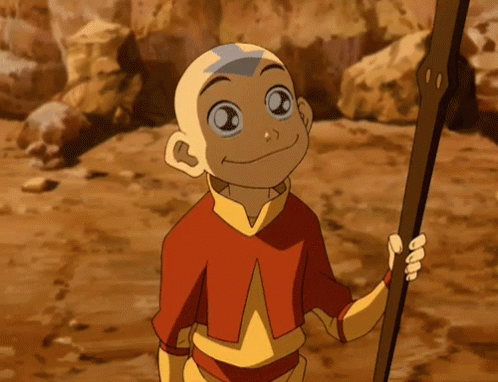
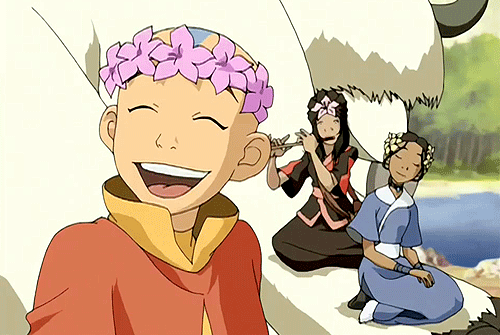
Throughout the story, Aang emerges as a pure being, whose character development evolves as he trains to become a great Avatar. Despite facing the darkness of the world, his losses, and the wounds he suffers, Aang continues to maintain unwavering faith that everything will be okay and that the world can be a better place. His beautiful and innocent glow, that childlike animation, sets him apart in a context where young characters are growing up amid war.
I observe the young characters in the show, like Sokka, Katara, Suki, Toph, Azula, among others; they are all children of war, forged by the conflict surrounding them. The emotions, decisions, and thoughts of these characters are inevitably influenced by war. Sokka is shaped by the war-torn context in which he grew up, just like Katara, Toph, Zuko, and Azula. The war determines their identities, regardless of which side they are on.
However, Aang is an exception to this rule. His first 12 years pass in peace, living without the shadow of a war that could affect his life, his personality, his beliefs, his innocence, and his morals. If Aang had been born amid war, his being would probably have evolved differently, perhaps leading him to more extreme actions like killing Ozai. But no, Aang refuses to kill Ozai because it goes against his moral principles.
It is true that Aang has his moments of tantrum and questionable behaviors, which are completely understandable given that he is a 12-year-old child. Unlike other characters like Sokka, Toph, Katara, and Zuko, Aang's destiny is practically set in stone. He is supposed to stop the war, defeat the Fire Nation, or perish in the attempt, having to wait for the next Avatar cycle. This weight on his shoulders is overwhelming for a child.
Aang also experiences moments of "micro-machismo," something we all possess to some extent, even the most deconstructed feminists. This is due to his upbringing in a society that, due to the era and other factors, influenced his perspective. But we see how Aang grows, progresses as a character and person. Although it is not right for Aang to get angry when Katara does not understand his feelings or to kiss her without her consent, I do not consider him an abuser, as some Zutara fans suggest.
I believe that if they had allowed both Aang and Katara to truly grow, giving them real time to develop as independent and adult individuals, I would have liked them much more.
So, let's clarify, I don't dislike them; I don't ship them, but I don't dislike them either. If you like them, that's fine. I firmly believe that everyone is free to ship what they want, without the need to discredit or diminish the ship they don't support. And this goes for fans of Kataang, Zutara,
Zukka, or any other ship from different books, movies, or TV shows. Freedom and respect for all shippers!
I edit and add:
They won't convince me easily. Korra is not canon. Aang would never be a bad father, and Katara wouldn't allow it either. Katara tears off his testicles and makes him swallow them before allowing Aang to be a bad father to all of his children. I understand that Aang has a special relationship with Tenzin, since he inherited his mastery of air, but don't try to fool me. Aang is an amazing father, and nothing will change my opinion on that, not even Korra.
Add something else that I forgot:
If Zuko and Katara were to have a romantic relationship, of course it would hurt Aang, because he is in love with Katara, but he would never ever get angry with either of them, because both Katara and Zuko are his family. and Aang loves his family. Stop calling the baby evil
#zuko x katara#zutara#pro aang#love for aang#I will fight tooth and nail to defend Aang#avatar the last airbender#avatar aang#aang#katara#zuko#katara x zuko#sokka#atla suki#toph beifong#azula
132 notes
·
View notes
Note
oh goodness gracious i'm AAAAAAAAAA i'm gonna giga ramble to you about the fic and awowaugheaorugdfgf one of the reasons I took that fic where it went from your comic because while I was playing, I always wished kerfur could "do more" sit on the couch with you, unlock doors, look at the TV, etc, little things like that to give you a little glimpse into who they might really be one of the things I do think is that kerfur is very, very enthusiastic about the things they do (they go into a full fucking sprint when you give them the report paper), and the same thing would apply to... an advance of some kind... one of the biggest, defining emotions in the game for me was the flip flop between "comfort" and "terror" in one moment, i'm listening to the morning music, kerfur just grabbed the reports, the drives are shipped away and everything is maintained/100% calibrated, nothing is happening, i almost WANT something to happen and the next, i get a jolt of abject terror down my spine because i THOUGHT i saw a shadow man outside and a lot of that comfort came from kerfur, the companionship, the something to lean on for me, the game was a paranoia nightmare until I settled in with that damn adorable robot, and outright fell in love (I was still anxious, but I was mentally prepped when TR3 goes out and you need to reset it on foot, no ATV, trekking in the snow with Kerfur behind me) it's not even like kerfur's design isn't inherently attractive? but you can develop that kind of love because of the way they can make you feel, what they are, what they do, what they become to you and I projected ALL of that onto Kel LMAO
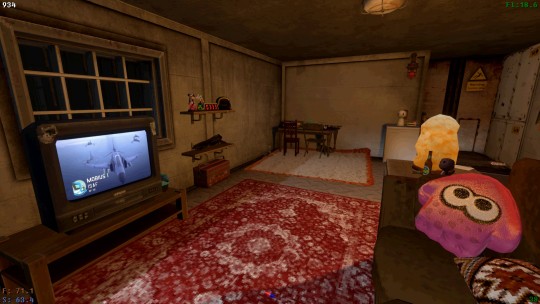
i have this whole living room/bedroom/saferoom (the door has a lock!) set up with two sleeping bags and a hotplate behind the couch and kerfur can't even sit on it >:( just, like my experience with the game, what I felt playing it, what I saw surrounding it the stuff you make hits me in the perfect spot, I wish Guard Mode was a real thing so damn bad kerfur refusing to be used as a tool, a learning, living, thinking thing, every bit as capable of the unfeeling horror those scientists feared capable of feeling hatred, wrath, apathetic disregard, violent tendencies, being influenced but also capable of every good thing in this world, the same as a person, of being nurtured and nuturing, of growing and learning core beliefs, feeling love, feeling warmth, a sense of humor they were scared of a person, and all of the volatility and unknown futures that come with being one, especially from a blank slate. kel and kerfur are the union of flesh and machine, not as a perverse monstrosity, what's seen in kerfu and skerfuro, in the Gray's technology, but bound in love and life. your art is all little snippets and angles of the exact feelings I had turned into pictures and it's <<<33333 which is probably why my fic ended up being the way it was

ROBOT LOVERS COME GET Y'ALL JUICE!!!!!!!!!!!!!!!!!!
HELLO HI THIS IS LATE IM SORRY LOL im on mobile most of the time and ask alerts get burried in notifs whoops
anyway i feel you, esp with wishing kerf could do more and such. I've always been a sucker for sentient robots who probably shouldn't be sentient, and the idea of robots gaining sentience and growing very attached to their one special human that their whole world revolves around. is that healthy?? no! is it compelling? very!!! lots of potential for complex and messy feelings on both ends. imagining kerfur growing into sentience very quickly bc kel treats them with dignity and shows them care is so fun, i like thinking about how they could potentially start doing more, leaning more. they start wanting things for themself. they want him. they don't know how to express that, at first
see, *i* think kerfur's design is inherently attractive xjdbjfs. funny story, i actually got lowkey tricked into getting invested in this game bc my partner essentially dangled cute robot on a stick in front of me. and it worked, because im predictable lmao. i defs projected that onto kel too, though. he'd think they're cute, even in their base form, but it's not something he let himself think too deeply about at first. he doesn't want to be weird about it. time and loneliness and companionship wears him down, though. he grows to care deeply far faster than he really should
or at least, that's one version. i like to play around with different versions of how that could go in my mind
i like your upstairs saferoom! i have something similar in mine, i made a comfy hangout spot for them in my second playthrough :3
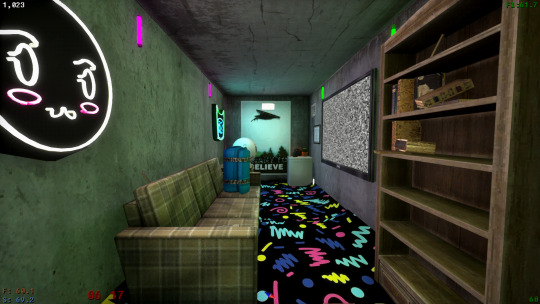
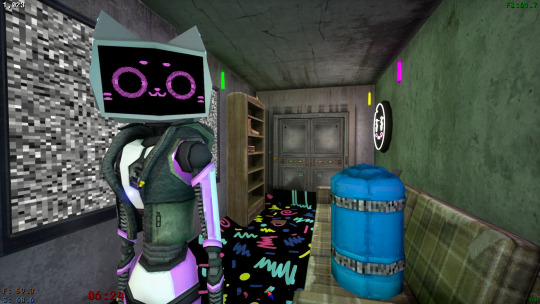
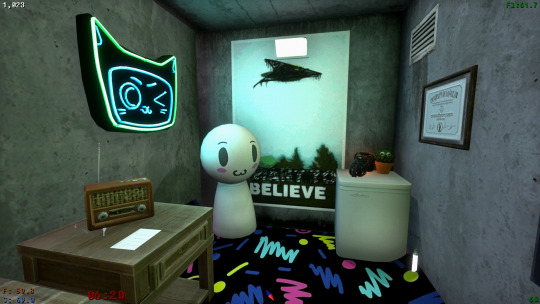
im glad the stuff i make hits you just right, I'm v flattered ;w; im just always weak for human/robot stuff and never get tired of that trope and all the fun stuff that comes with it
i like other aspects of the game too obvs, but im very attached to kerfur 💜
#geheheheee#votv#kel/kerfur#kerfur#ask miz#oughhhhhh normal about them#ive been braining about kel for like a month straight lol#i think he deserves a group of arirals and a cute robot snuggle with. as a treat#i also think he should be really weird about his cute robot and then have a crisis about it and then get comforted by said cute robot
22 notes
·
View notes
Text
Deep down, I think AU Michael wanted Jack by his side.
Having an enemy like Jack was probably the most direction he’d felt in ages. It gave his aimless war structure... like a sense of pseudo-purpose.



///
It was a balm against all that nihilism, if only because Jack was something concrete to strive against.


///
AU Michael’s nihilism is his outward response to grief. It grew out of God abandoning him, and because killing Lucifer was a sacrifice that meant nothing in the end.
But what makes it so compelling is that Michael's secret, inward wound seems to be a deep loneliness, a hunger for companionship. And that comes out... in his interactions with Jack.
In 14x01, Michael tests the people around him with the question, "What do you want?" If their wants are predictable and manageable, they’re easier to keep at an emotional arm’s length. (Easier NOT to be disappointed by.)
(SEE: This is also a Chuck and Amara theme. ALSO SEE: Metatron and Chuck in Don't Call Me Shurley.)

And...
Humans are too lost / too complicated / too real (SEE: Michael does VERY badly with contradictions and nuance):


Angels-"soldiers" are too armored / too homesick / too wound up waving the flags of things they don't care about to cover up all the things they care about TOO MUCH.
AU Michael doesn't want people that are attached to the idea of home, a family (i.e. people who are traditionally more like Dean or Cas)



AU Michael thinks he wants people who are fully committed to his cause—people who don’t care about redemption, who aren’t trying to fix their families or make peace with their pasts, and who don’t want to save the world….
He believes that makes them strong. But really, this is a companion who just wants to be supported. Not challenged. (Not lived with, through all of life's disappointments and complexities.)
It works for missions because:



It's (poughkeepsie) "Pure" and "Simple."
///
Because here's. The thing.
Despite Michael's modus operandi being revealed as NIHILISM...

And despite him wanting to be surrounded with all these loyal companions...

…what he wants REALLY wants is the complicated mess of FAMILY.
The one thing he never honestly asks himself... is what what he HIMSELF wants deep down.
(SPOILER: it's not as simple as destruction and revenge...)
In a very Sam-coded fashion, I think Michael's disdain is a mirror.
I think what he hates in humans and angels is what he hates in himself. Like humans, he doesn’t really know what he wants beyond nihilism and revenge on his father. He's lost, too.
And though he’d never admit it, like angel-soldiers, he’s homesick.
But… he can never go home, because he destroyed his home…
…and everyone he loved.
///
If what AU Michael really longs for is family—it becomes clear why he’s so fixated on Jack…
…and why he’s so cruel to Jack...





Michael is being "sarcastic" here, but he's ALSO revealing his hand.
He’s actually totally transparent about it, in the way only someone deeply in denial can be.
When Jack says, “No. I hate you,” it vexes Michael, even if he won't admit it.
Make no mistake, Michael’s following lecture about power is a secret appeal to Jack.
“You'll see it all... with me,” is the hand showing itself again... and why Michael REALLY wanted to kidnap Jack.


It's why Michael can't help but pivot next to the ones he's actually jealous of: Cas, Sam, Dean.



And Jack's faith in them... is also vexing.
///

14x09 (via @spnscripthunt-inactive)
"A moment of familial weakness," Michael later admits.
He's bragging about his superiority to the humans / Cas because it irritates him that Jack is more loyal to THEM than he is to Michael.
And of course, there's the elephant in the room: The most painful thing in the universe for AU Michael to face WOULD OF COURSE be a father that loves a son. A family that loves and is loyal to each other despite all the complexities, negativities, and imperfections.
And it's why he gets so vicious with Jack, too, in the next scene:
(It's why this -> "They don't love you.")


WHICH IS OF COURSE AU MICHAEL CODE FOR:
"Despite all my bluster and my nihilism, it upsets me you don't want ME as your family."
(A) I'm going to pretend that I never kidnapped you and wanted to be your family in the first place
(B) family is a JOB anyway it doesn't matter... Lucifer was an obligation that I do NOT MISS... NOPE NOTHING TO SEE HERE
(C) Actually, now that I think about it, I really want to hurt you for not picking ME, Jack
All in all...
Jack was the first thing in a long time... that gave AU Michael's endless nightmare life some meaning.
#spn 14x01#spn 14x09#au micahel is a transparent bastard#jack and michael#au michael and jack#spn 13x10#the naomi one caused this one actually#it's the related theme they're SO#au michael stuff#nihilism vs meaning#always and never statements in spn#the chuck-coded fear of disappointment#the harper-coded ideal of perfection
6 notes
·
View notes
Text
By complete happenstance, I ended up rewatching The Last Unicorn.
I remember seeing it at least once when younger (and not in its original English form), but never fully paying attention to it.
It's such an interesting hodgepodge of creative decisions.
A fusion of western and eastern cartoon (anime) aesthetics, a fusion of the humour in children's cartoons and the surprisingly more dark subjects that cartoons were willing to go into at the time and a fusion of a Disney musical and a straight-forward animated feature.
So, as a result I got a bunch of tonal whiplash out of it, but not always in a bad way?
I hated the butterfly character at the start of the movie because it reminded me of the worst of the cartoons of that era. Really obnoxious, unfunny and really jarring compared to the tone of the intro, it even almost made me stop watching the movie.
But I absolutely adored the skeleton character in the latter half, which was an equally comedic character, but fused the humour with the darker setting perfectly.
The switch between the more old-timey speak and fantasy score and 80s cartoon humour and insert songs (none of which really did anything for me except the title track, which is pretty catchy) was jarring, but the fantasy parts are what kept me going through it.
The animation could almost never keep up with the story's ambition, but the background work and storyboarding lead to some beautiful art regardless.
The bull and unicorns at the end are very visually striking and are probably what made me remember the movie for so long.
To put it more simply: you also have tree boobs and contemplating (im)mortality in the same movie.
It's peak old anime tonal whiplash in a western cartoon guise and despite any criticisms I have for it, I kind of adore it.
Because it has strong character and theme throughlines.
Because despite Schmendrik being the silliest of names, he does have a character arc of going from a bumbling fake to a genuine and confident hero. His growing confidence and good heart gave him the magic he so wanted. It simply appears when needed the most.
I never realised how surprisingly complex The Unicorn's/Amalthea's arc was, especially.
An immortal being was not only made mortal, but also given feelings as a result.
She learned fear and sorrow and regret. But also true happiness and love.
The initial story was about her looking for companionship and a place to belong because she learned she might be the last of her kind, but it lead into her understanding mortality and humanity and understanding what she wants and who she is and doing what is right, when needed – a little bit of a running theme as you might notice.
The two final characters in this thematic web are King Haggard and Prince Lir, his son.
At first Prince Lir is a show-off, who values feats of strength above all else, wishing to win Amalthea's heart that way, but as a part of the thematic web of the movie, he not only learns this is not the way that leads to love, but also to do what is right not because of it being an impressive feat of strength, but because it is what is right.
I'm never a fan of fairly quick romances, but Prince Lir and Amalthea falling in love is at least important to both of their arcs.
It leads both of them to learning what true love and happiness looks like, but also doing what is right from there.
Both of them end up choosing the selfless option over the selfish one: the unicorns could've stayed trapped in the sea for the literal eternity because they are immortal, but Amalthea chooses to go face the bull even if she might be trapped and never be able to be together with Lir.
She basically chooses the freedom of the unicorns over their love, which is in contrast with the main villain of the movie, King Haggard.
Haggard is the opposite of all of these character arcs of learning to do what is right when needed.
The strongest moment of happiness he ever experienced was when he saw the unicorns, so he decided to trap them in the sea by his castle forever using the bull, for his happiness alone.
From his introduction, we see several ways he tries to find happiness.
He fires his magician in hopes of finding entertainment in a different form of magic. Prince Lir isn't his own son, he found and adopted him in the hopes of it making him happy.
And it never does. But he is also insular and incredibly paranoid about the unicorns breaking free. He tries anything else but to actually connect to others and thinks of nothing else but his own happiness, making him a simple mirror for the heroes and their arcs.
It's a strange kind of movie, with much heart and charm, but also fairly limited animation that sometimes really can't keep up with what the story is trying to do, tonal issues and perhaps turning points which are reached too quick and with not as much substance they should have, but I often find stories I consider to have interesting flaws more compelling than more polished ones, so this is very deeply in my ballpark.
7 notes
·
View notes
Note
whats ur fave magi arc?
Omg! The answer to that one might surprise you. Because everyone I've ever met assumed on the spot that Kou's war Arc is my fave, given that Judar and Hakuryuu are my favorite characters and I also ship them to the moon and back, but the Arc I hold a special place in my heart for is the final arc of it - hear me out!

Maybe its because of people heavily critizizing it at that time, but it's genuinly way better than given credit for. While there's some pacing issues and a lot of interessting development being left out in the time skip or entirely, I love some aspects of it so much.
For example it's the true Juhaku arc even with way less panel time. Hakuryuu isnt entirely focused on his mission and revenge anymore, and genuinly seems to care a lot for Judar, wanting to know him better and seeking his companionship. Before this arc people assumed Judar would ditch Hakuryuu entirely for kind of redeeming himself (or trying to) and becoming a "good person" again. He didn't. Judar's loyality towards him is unquestionable, no matter what Hakuryuu does. They also both accepted themselves, their fates, and their lifes, and becoming two people that are in now way perfect, but feel human and real. Judar was introduced as evil, while Hakuryuu seemed nice and caring overall. Judar showed to be vulnerable, lonely and not as cold-hearted while Hakuryuu clashed out in anger during. They both embraced both sites of themselves in this arc.
Their development was greatly summanized during their clash against Sinbad in the sacret palace. Because Hakuryuu offially lost the test of convincing Sinbad to change his mind, I think he showed he had grown so much compared to their first meeting. And I think he won here. Because both Hakuryuu and Judar managed to understand the limits of their abilities, while Sinbad couldn't admit to have done anything wrong until the end.
Let's also talk about Sinbad because when he first "died" you just had to be there. The whole fandom was in literal tears. And later people tended to dislike both him and the plot centering around him becoming god. I get that it was a heavy shift in tone for the manga in general, but this also recently happened in another more popular show: Arcane. Everyone talks about how great and complex Viktors arc was, but he and Sinbad quite literally had the same motivation and storyline in season 2. I think Sinbad in the final arc was well-written and tied perfectly to Sinbad no Bouken manga.
I loved the fight of Yunan and Hakuei(Arba)!
I also liked Alibaba's arc, even through he appeared a bit too accepting, selfless and nice. But I also have the same problem with Morgiana and Aladdin sometimes. I think for them to sometimes during the manga showed jealousy, anger or frustration more instead of instantly forgiving would make me like them more. Especially Aladdin, who wasn't even a little angry at Arba for all she had done.
All in all, the greatest issue in this arc for me wasn't what was there, but what we havent been shown. Tess reuniting with his mother, the reveal of Judars true name etc. I think with it being hinted so much, Othaka initanally planned to include those things, but simply ran out of time here. And I don't like the last chapter, even through it leaves us with a whole new world of possibilties to expand in fanfics etc.
Sinbad choosing Alibaba as the "one true king of the world" felt like Game of Thrones declaring Bran the king of the iron throne because "who has a better story?" Everyone else. Kouen, Koumei, Hakuei. Maybe not Hakuryuu, because lets be real, it wouldn't end well, but Alibaba? No.
Aside from all of that, Kou war arc is PEAK shounen and is clearly on par with it. I'm still mourning the artstyle change towards the final arc. Nothing, for me, will beat the fight Gyokuen vs Hakuryuu and Judar.

I say final arc because other arcs are more loved than that, and while they feel more even or exciting, I appreciate it. I also started reading the manga just before the time-skip, so this was the first one I actively read together with the rest of the fandom.
Good times- Judar where are you? memes and all.
#magi#please don't come at me I need to protect my unpopular baby#Balbadd arc is also peak!#least fave is Magnostatt#I always skip that one lmao
7 notes
·
View notes
Note
I have thoughts and feelings about minted yoongi. I don't think he is heartless and cold. I think he is a deeply emotionally intelligent man, deeply sentimental and lonely. Longing and hoping for companionship and someone he can trust. Considerate and calculating can exist in the same person.
Also I just really want to know more about his affiliations. Why does he have all the tattoos? What is his backstory? How did he end up where he is? I have a feeling he is in a very unique position given his knowledge of what happened in the past which seems like it was supposed to be buried and secret.


oh my god i love this whole take on his character! because yes, these characters can seem one way, but show a lot more than tell. especially between the lines, which minted yoongi has a whole lot to comb through in his actions and words and decisions. layers — and complex ones at that — are what these people are gonna have. because it’s just human nature, no matter what box we try to put them in. so i love your analysis so much🥺
and the theories!! so many questions still and we have a lot of ground to cover. exciting things! this is a whole universe, and we’ll go on a journey with them as we learn about it ourselves🥳
#we shall see!#but i love love love when y’all think about these#it’s some of the coolest asks to receive#so thank you!#absolutelyyoonbiased#asks:minted#minted3#mntd:yoongi#mntd:theories#*ryenfictalk#mailbox💌
10 notes
·
View notes
Text
Chobits is an asexual fantasy and yall feel weird because a show has never catered so hardcore to demiromantic asexuals until Chobits.
I highly recommend reading it to watching the anime. The anime deviates quite a bit from the manga and cuts a lot of important details from the last arc. Spoilers ahead for the end of the show, i will get into basically everything soooo be warned.
Feel free to fight me in the comments, i love discussions :>
At its core Chobits is a romance between a human cishet man- Hideki- and a female asexual Robot/Persocom -Chi-. Its a slow burn romance, where Hideki is given time to observe the complex relationships around him, before coming to a decision, while Chi has more of an introspective journey of finding out what she wants outside of her programming.
Chobits explores quite a number of themes and ideas about romance and the nature of sapience:
The most glaring is the idea of Human/Persocom relationships and romances. Is a Persocom with complex enough programing sapient? Is it enough that the human observer believes their Persocom is sentient for it to be? When a Persocom consents, does it really?
We see people become obsessed with their Persocom who can do anything ,without question, to the point where they neglect their spouses. At the same time we see people who are wholeheartedly in love with their Persocom, and who endure the societal pressure to seek human companionship. We see characters who create a Persocom duplicate of their deceased loved one, and their emotional struggle.
We are shown the effects of the sociatal pressure on women to rise up to the beauty and "perfection " standards that these dolls bring to the table.
Okay okay buuuut wait WalkingTornado, isnt this that one anime where her power button is down THERE?!?!
Yes, thats the one. Its treated as a comedic hook in the first chapter because Hideki has zero experience and background information and we see the world though his extremely naive eyes.
After learning from those around him about the nature of a romantic relationship with a Persocom, he is hit with the magnitude of that perticular design choice. Chi has no innate desire for sex, and should she have sex, her fundamental personality will be deleted and changed forever.

And Hideki, accepts to enter a purely romantic relationship with Chi, and consents to not have sex with her ever, despite being allosexual.
He doesnt ask if they can move/remove the button, he doesnt ask if he can possibly have oral, he doesnt ask if he can date someone on the side, he doesnt ask her to sacrifice her being for his sexual benefit.
He accepts her as she is and respects the now completely asexual nature of their relationship.
Now onto the negatives: The asexual being a robot is nothing new, but is it problematic? Maybe, but considering that so much media has trouble accepting an Asexual as not a broken/ill/hasnt met the right person/traumatised/low libido/nun who has to get over themselves and just have sex like the rest of us, Chobits with it unusual premise, does a good job of portraying an asexual romantic relationship using an unconventional premise.
I pray for a future, where asexual representation in media gets to a point where we can look back and snicker that hehe they thought we were all robots. But till then, i will defend Chobits as my go to Asexual media to my dying day.
15 notes
·
View notes